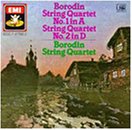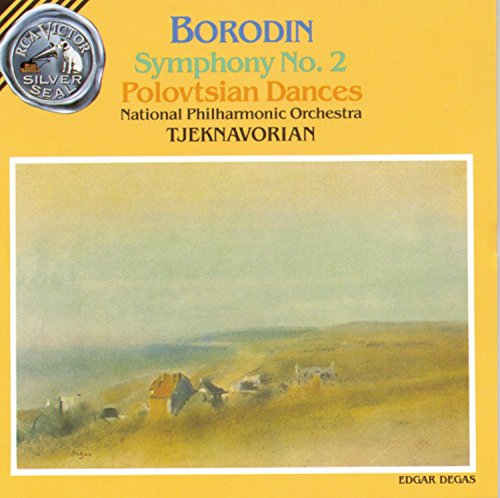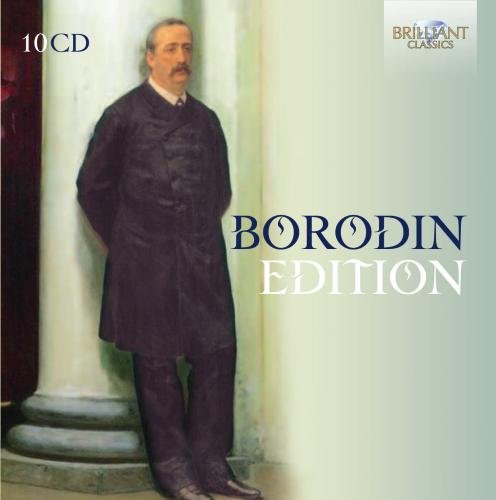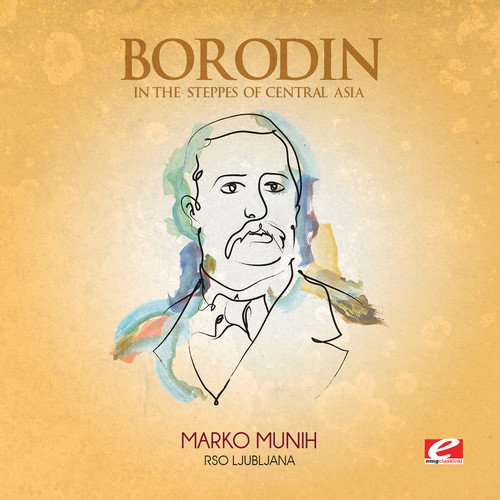Background
Alexandr Porfyrievich Borodin was born in St Petersburg, Russian Empire (now Russia) on the 12th of November 1834; natural son of a Georgian nobleman, Luka Stepanovich Gedevanishvili, and a Russian woman, Evdokia Konstantinovna Antonova.



(The Borodin Quartet plays the music of its namesake as to...)
The Borodin Quartet plays the music of its namesake as to the manner born. Theirs is a beautiful, lush realization of this lyrical work, polished and full of nuance, and well-served by the 1980 analog recording. The coupling with Borodin's First Quartet is especially attractive. --Ted Libbey
http://www.amazon.com/gp/product/B000002ROX/?tag=2022091-20

(No Description Available No Track Information Available M...)
No Description Available No Track Information Available Media Type: CD Artist: BORODIN,A. Title: SYM 2/PRINCE IGOR Street Release Date: 04/09/1991 Domestic Genre: CLASSICAL COMPOSERS
http://www.amazon.com/gp/product/B000003F1U/?tag=2022091-20

(After a highly acclaimed series of Brahms chamber music r...)
After a highly acclaimed series of Brahms chamber music releases for Onyx, Britain's preeminent chamber group the Nash Ensemble turns their attention to 19th-century Russian repertoire. Glazunov's superbly crafted String Quintet of 1891 is coupled with Arensky's two-cello second String Quartet, and Borodin's unfinished Sextet for strings, written, according to the composer, in Mendelssohnian style 'to please the Germans' while he was in Heidelberg.
http://www.amazon.com/gp/product/B0075ID9OE/?tag=2022091-20

(The Sofia National Opera Chorus has garnered acclaim the ...)
The Sofia National Opera Chorus has garnered acclaim the world over and is accompanied here by the Sofia Festival Orchestra. The recording also boasts a wealth of celebrated vocalists, including Boris Martinovich and Stefka Evstatieva. This recording of the best loved and Russian romantic opera, Prince Igor has been unavailable for quite some time.
http://www.amazon.com/gp/product/B00BI8SEMY/?tag=2022091-20

(Alexander Porfir'yevich Borodin inarguably best known for...)
Alexander Porfir'yevich Borodin inarguably best known for his membership in the Russian Mighty Handful was a chemist by profession and composed in his spare time. Despite the hint toward dilettantism that might be suggested nothing amateurish can be traced in the small but sophisticated opus left to us. This near-complete edition comprehends his three highly original symphonies complete chamber music songs piano music and his unfinished masterpiece opera Prince Igor. Mostly Russian performers execute flawless performances with distinct national flavor.
http://www.amazon.com/gp/product/B008GAXV84/?tag=2022091-20

(Alexander Borodin's In the Steppes of Central Asia perfor...)
Alexander Borodin's In the Steppes of Central Asia performed by the RSO Ljubljana with Marko Munih conducting. When sold by Amazon.com, this product will be manufactured on demand using CD-R recordable media. Amazon.com's standard return policy will apply.
http://www.amazon.com/gp/product/B00DHTJ6KG/?tag=2022091-20
Alexandr Porfyrievich Borodin was born in St Petersburg, Russian Empire (now Russia) on the 12th of November 1834; natural son of a Georgian nobleman, Luka Stepanovich Gedevanishvili, and a Russian woman, Evdokia Konstantinovna Antonova.
He was brought up to the medical profession. In 1850 he entered the Medical–Surgical Academy in Saint Petersburg.
In 1862 Borodin was appointed assistant professor of chemistry at the St Petersburg academy of medicine. He wrote several works on chemistry, and took a leading part in advocating women's education, helping to found the school of medicine for women, and lecturing there from 1872 till his death. But he is best known as a musician. His interest in music was indeed stimulated from 1862 onvards by his friendship with Balakirev, and from 1863 by his marriage with a lady who was an accomplished pianist; but in his earlier years he had been proficient both in playing the piano, violin, cello and other instruments, and also in composing; and during life he did his best to pursue his studies in both music and chemistry with equal enthusiasm. Like other Russian composers he owed much to the influence of Liszt at Weimar. His first symphony was written in 1862-1867; his opera Prince Igor, begun in 1869, was left unfinished at his death, and was completed by Rimsky-Korsakov and Glazounov (1889); his symphonic sketch, "In the Steppes" (1880) is, however, his best-known work. Borodin also wrote a second symphony (1871 - 1877), part of a third (orchestrated after his death by Glazounov), and a few string quartets and some fine songs. His music is characteristically Russian, and of an advanced modern type. He died suddenly at St Petersburg, on the 28th of February 1887.
Borodin was a promoter of education in Russia and founded the School of Medicine for Women in Saint Petersburg. He was among the first chemists to demonstrate nucleophilic substitution, as well as co-discoverer of the aldol reaction. In 1954, Borodin was posthumously awarded a Tony Award. He was a member of The Five, five prominent 19th-century Russian composers who worked together to create a distinctly Russian classical music.
(After a highly acclaimed series of Brahms chamber music r...)
(Alexander Porfir'yevich Borodin inarguably best known for...)
(Alexander Mndoiantz, piano - Alexanderr Polonski, violon ...)
(The Sofia National Opera Chorus has garnered acclaim the ...)
(Alexander Borodin's In the Steppes of Central Asia perfor...)
(No Description Available No Track Information Available M...)
(The Borodin Quartet plays the music of its namesake as to...)
He married Ekaterina Protopopova, a pianist, in 1863 and had at least one daughter, named Gania.
